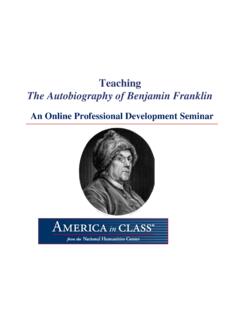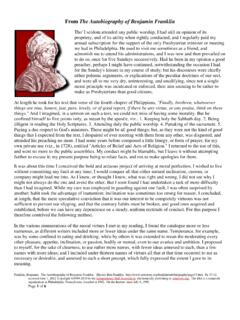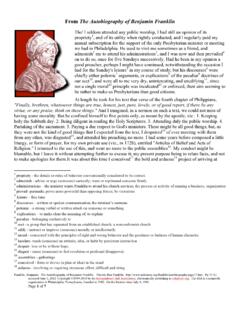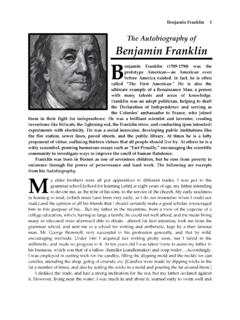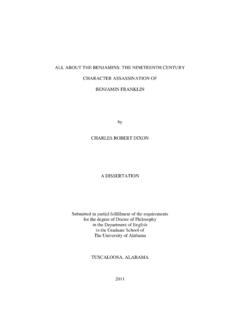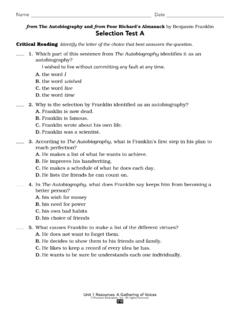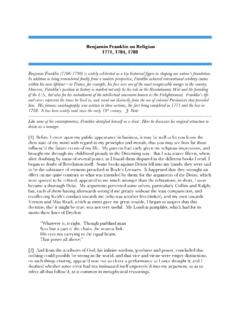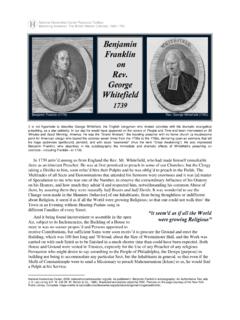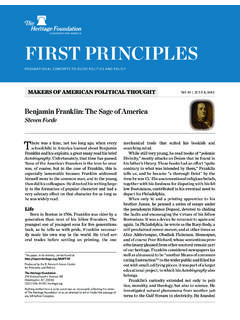Transcription of Learning from Franklin’s Mistakes: Self-Interest Rightly ...
1 Learning from franklin s Mistakes: Self-Interest Rightly Understoodin theAutobiographyChristopher S. McClureYou are young and have all the world before you; STOOP as you gothrough it, and you will miss many hard thumps. Cotton Mather s advice to the young benjamin FranklinAbstract: benjamin franklin divides the mistakes he lists in theAutobiographyinto errata and great errata. He derived no benefit from the latter, but some benefitfrom the former. Examining franklin s regret, or lack of regret, at these errata opensa window onto franklin s understanding of morality. The laxity in his list of virtuesand hisflexibility with regard to conventional morals stem from the insightFranklin tells us he gained from these errata.
2 For franklin , or at least his persona intheAutobiography, there was no conflict between egoism and altruism, and he istherefore the embodiment of a type of Self-Interest well understood. Tracing thestory of the errata, which franklin inserted into an earlier draft of the work sfirstpart, and franklin s later actions provides the key to understanding the rhetoricalstrategy of theAutobiography, and the reason he never wrote his proposedArt of the opening of theAutobiography, benjamin franklin tells his son that if hecould live his life over again, he would ask only the Advantages Authorshave in a second Edition to correct some Faults of thefirst. 1He does notsay he would correctallof these faults, though, but that he would happilyrepeat his life again, faults and all, if given the chance, thus implying thathe may in fact have gained something from some, if not all, of his thefirst part of the work, franklin points out several of the faultsin thisfirst edition of his life, which, in keeping with the printer s terminology,he calls S.
3 McClure is a Postdoctoral Fellow, Harvard University, 1350 Massachusetts Ave, Cambridge MA, 02138 franklin , autobiography and Other Writings, ed. Ormond Seavey (Oxford:Oxford University Press, 1993), s statement here is also ambiguous regarding the issue of whether, onrepeating his life, he would do so with the benefit of the wisdom he had gained onhisfirst Review of Politics 76 (2014), 69 92. University of Notre generally give little weight to these errata, and see themsimply as youthful indiscretions committed before franklin smoralandreligious , though, tells the story of these errata inorder to show how he arrived at his central insight into morality andvirtue and why he thought that a true understanding of these couldnot be contained in a list of dogmaticinjunctions.
4 Butrequiredakindof reflective prudence that allowed one a degree of latitude in one sactions that could often appear to others as transgressions of conventionalmoral key to understanding the story of the errata is paying attention to whatFranklin says he gained or lost from each of thefive he mentions, and his dis-tinction between great errata and errata simply. With the former Franklingained nothing and gave himself a great deal of trouble, while with the latterhe in fact gained something, despite in one way or another contravening con-ventional came to understand that the rules of virtue and thedictates of revelation are set out not because they are ordained by God, orin accord with some metaphysical order, but because they are good for us,and, although franklin never says as much in so many words, whenrightly understood, these do not require sacrifice, charity, or any kind of altru-ism.
5 But may in fact require some transgression of traditional moral will argue in this paper that this apparent moralflexibility andFranklin s unabashed Self-Interest were always simultaneously in theservice of others, which franklin came to see was the route to the most satis-fying kind of happiness, and were informed by the lesson franklin learnedfrom the , and notably Aldridge, claim that franklin s motivation in laterlife was primarily a sense of altruism and charity, and it is easy to readhim this way, but franklin never makes any such claims about his own3 See, for example, Lorraine Pangle,The Political Philosophy of benjamin franklin (Baltimore: Johns Hopkins University Press, 2007), 65.
6 Charles L. Sanford, AnAmericanPilgrim s Progress, American Quarterly6 (1954), quoted inBenjaminFranklin s autobiography : An Authoritative Text, ed. J. A. Leo Lemay and P. M. Zall(New York: W. W. Norton, 1986), 311, sees the errata as analogous to Christian s sinsin Bunyan sThe Pilgrim s conventional morality, or traditional standards of morality, I mean loosely whatwould have been considered the moral norms of franklin s time and place (many ofwhich, of course, remain the moral standards of today). That is, one should behonest, not steal, commit adultery, pay one s debts, ,Political Philosophy of benjamin franklin , 122, notes that even when[ franklin s] appeal was to charity, he found a way of weaving prudent calculationinto the mix.
7 Edmund Morgan, benjamin franklin (New Haven: Yale UniversityPress, 2002), 17 25, 30, quoted in Jerry Weinberger, benjamin franklin Unmasked(Lawrence: University Press of Kansas, 2005), xii, also notes that franklin does notinclude charity in his list of REVIEW OF theAutobiographyFranklin explains even his most public-spiritedactions in terms of some benefit to himself, and primarily in terms of his example, franklin explains his motivation for starting a sub-scription library, one of his best-known benefactions,first in terms of a benefitto himself. This Library afforded me the Means of Improvement by constantStudy, franklin says, since the booksellers in Philadelphia did not carry thekinds of books franklin needed and it was inconvenient to order books fromEngland ( autobiography , 81, 79).
8 More importantly, franklin was able togratify his sense of vanity by claiming atfirst that the library was not hisidea, and waiting until another claimed credit for it, and was then shownto be taking credit for franklin s achievement: If it remains a while uncertainto whom the Merit belongs, some one more vain then yourself will be encour-ag d to claim it, and then envy will be dispos d to do you Justice, by pluckingthose assum d Feathers, & restoring them to their right Owner ( autobiography , 81). franklin was thus able to maintain a reputation formodesty through this device, while taking credit for the populace of the colo-nies being better instructed & more intelligent than People of the same Rankgenerally are in other Countries ( autobiography , 80).
9 The Library Companywas also incorporated in perpetuity by a charter a few years after its incep-tion, and thus served as a lasting legacy ( autobiography , 80). franklin similarlysays about his scheme for matching funds contributions for a hospital, I donot remember any of my political Maneuvres, the Success of which gave me atthe time more Pleasure. Or that in after-thinking of it, I more easily excusedmy-self for having made some Use of Cunning ( autobiography , 127).This same pattern is apparent in franklin s other acts of public utility, whichfrequently involve some manipulation of human nature. This manipulationand franklin s self-interested motives were often the targets of famous detrac-tors such as John will show, however, that although these critics6 Alfred Owen Aldridge, benjamin franklin and Nature s God(Durham, NC: DukeUniversity Press, 1967), 58, says of franklin that the system he evolved was funda-mentally altruistic.
10 7 See Steven Forde, benjamin franklin sAutobiographyand the Education ofAmerica, American Political Science Review86, no. 2 (1992): 359, who describes whatwe could call franklin s hierarchy of goods, from wealth to virtue to happiness: TheAutobiographyfirst caters to the reader s presumptive (and presumptively legiti-mate) concern with wealth, then directs it toward a much fuller vision of human hap-piness and the well-lived life. 8 John Adams, John Adams on franklin , Boston Patriot, 15 May 1811, quoted inBenjamin franklin s autobiography , ed. Lemay and Zall, 244, speaks of the the turpi-tude of [ franklin s] intrigues and his ability to dissemble for the sake of differentaudiences.
